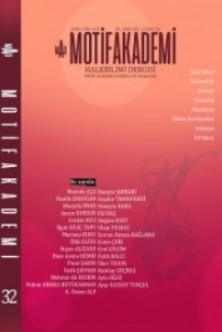BEKİ L. BAHAR'IN ANILARINDA ANKARA YAHUDİ TOPLUMUNUN “SOMUT OLMAYAN KÜLTÜREL MİRASI”
“INTANGIBLE CULTURAL HERITAGE” OF ANKARA JEWISH COMMUNITY IN THE MEMOIRS OF BEKI L. BAHAR
Author(s): Ayşe Ulusoy TunçelSubject(s): Cultural history, Jewish studies, Local History / Microhistory, Social history, Ethnic Minorities Studies
Published by: Motif Halk Oyunları Eğitim ve Öğretim Vakfı
Keywords: Beki L. Bahar; Ankara Jews; intangible cultural heritage; Istiklal Neighborhood; cultural memory;
Summary/Abstract: Beki L. Bahar, who was born in Istanbul, is a Jewish-born author who lived in Ankara for more than forty years (1937-1980). In addition to the outstanding works in poetry, story and theater types written by Bahar in Turkish, remarkable contents about city history and city folklore fields, which are present in memoirs, essays and research papers, also become prominent. In these articles, the social structure of Ankara after the Republic and the practices of the Ankara Jewish community in the context of intangible cultural heritage were discussed in parallel with the author's observations and researches. The cultural elements that Beki Bahar gave information in his writings, can be classified in the form of practices related to marriage, practices related to birth, death, child and disease, culinary culture and hosting guest traditions, adult and children's games. This cultural heritage, which was formed in the Anatolian geography and found a living space here, is similar to the cultural practices of the Anatolian Turkish society to a certain extent. Istiklâl Neighborhood, where the Jewish community lives with its unique lifestyle and architecture, is a good example of the vital function of the neighborhood in preserving a culture. Individuals who moved from the neighborhood to the various districts of Ankara were also able to partially protect their cultural identity as they maintained their contact with this neighborhood. On the other hand, although the neighborhood culture continues to exist, the cultural changes that started in the Turkish society in the 50s show itself in the jewish society as well. The cultural practices that were weakened by leaving the neighborhood have disappeared or changed with 'human' and 'place' as a result of the society migrating from Ankara for various reasons.
Journal: Motif Akademi Halkbilimi Dergisi
- Issue Year: 13/2020
- Issue No: 32
- Page Range: 1406-1425
- Page Count: 20
- Language: Turkish

